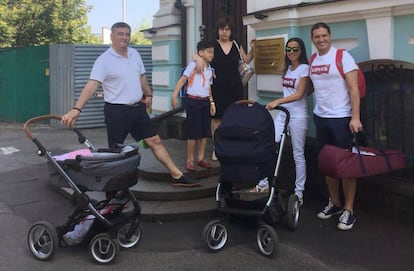Spanish couples undergoing surrogacy processes left in legal limbo in Ukraine
A total of 30 families are unable to secure passports for their children, after the Foreign Affairs Ministry says it has detected reports of malpractice and possible trafficking


The Spanish Consulate in Kiev is examining the cases of 30 Spanish families currently in Ukraine and who are unable to obtain a Spanish passport for their babies after entering into what is an illegal practice back home: paying a surrogate to carry their child.
According to a statement issued by the Foreign Affairs Ministry, ¡°dealing with this kind of case is a very delicate matter for the Consular Department of the Spanish Embassy in Kiev as it has received reports in recent months of possible cases of malpractice linked to assisted conception, such as the possible trafficking of minors.¡±
Until July, babies born to surrogates in Ukraine were registered without fuss at the Spanish Consulate in Kiev
The statement also warns against ¡°entering into any surrogate pregnancy process within this context.¡±
The Consulate was echoing a post on the Spanish Embassy¡¯s website, which alerted Spanish nationals to the scams and shoddy practices of certain assisted-reproduction clinics in Ukraine, involving irregularities in the pregnancy process, induced abortions six weeks into the pregnancy so couples are forced to embark on another costly IVF treatment, and a general lack of medical attention during pregnancy.
Until July, babies born to surrogates in Ukraine were registered without fuss at the Spanish Consulate in Kiev.
The Spanish Foreign Affairs Ministry, meanwhile, denies press reports from earlier this week that claimed new European Union regulations on personal data protection, which were said to be affecting the reception in the Consulate of DNA samples used to determine the parents of the child, have had any bearing on the freezing of the registration process.
¡°This is just one of many aspects taken into account while dealing with each individual case, whose compliance with both Spanish and Ukrainian law must be verified together with the validity of the papers,¡± said a spokesperson from the Consulate.
One possible solution would involve applying for a Ukrainian passport for the baby
For the Spanish couples caught in this predicament, there is little to be done until their appointments come up at the Consulate, which could be in November and beyond. The Foreign Affairs Ministry has insisted the couples will be seen on an individual basis and informed of ¡°current legislation and legal alternatives¡± with assistance offered to pursue possible solutions.
While registration has not yet been point-blank refused to any of the couples, a Foreign Office spokesman said shortly before the statement was issued that they were working with the local authorities to study alternatives in the case of such an event.
Given such a scenario, one possible solution would involve applying for a Ukrainian passport for the baby, thereby allowing he or she to leave Ukraine. And, once in Spain, the parentage could be established through the courts. This is the route being suggested by some of the lawyers representing the couples in question. It was also suggested by a staff member at the Consulate to a couple who are expecting their surrogate to give birth in the next few days.
Previously, the genetic Spanish father and the Ukrainian mother would be registered as the baby¡¯s parents. ¡°Once in Spain, the wife would then adopt her husband¡¯s child with the prior consent of the surrogate mother,¡± says Franco Antonio Zenna, a lawyer who specializes in surrogacy issues and who is representing some of the couples. ¡°It is as though a child has been born from a husband¡¯s affair. At least that is how it has worked for the last seven or eight years at least.¡±
English version by Heather Galloway.
Tu suscripci¨®n se est¨¢ usando en otro dispositivo
?Quieres a?adir otro usuario a tu suscripci¨®n?
Si contin¨²as leyendo en este dispositivo, no se podr¨¢ leer en el otro.
FlechaTu suscripci¨®n se est¨¢ usando en otro dispositivo y solo puedes acceder a EL PA?S desde un dispositivo a la vez.
Si quieres compartir tu cuenta, cambia tu suscripci¨®n a la modalidad Premium, as¨ª podr¨¢s a?adir otro usuario. Cada uno acceder¨¢ con su propia cuenta de email, lo que os permitir¨¢ personalizar vuestra experiencia en EL PA?S.
?Tienes una suscripci¨®n de empresa? Accede aqu¨ª para contratar m¨¢s cuentas.
En el caso de no saber qui¨¦n est¨¢ usando tu cuenta, te recomendamos cambiar tu contrase?a aqu¨ª.
Si decides continuar compartiendo tu cuenta, este mensaje se mostrar¨¢ en tu dispositivo y en el de la otra persona que est¨¢ usando tu cuenta de forma indefinida, afectando a tu experiencia de lectura. Puedes consultar aqu¨ª los t¨¦rminos y condiciones de la suscripci¨®n digital.










































